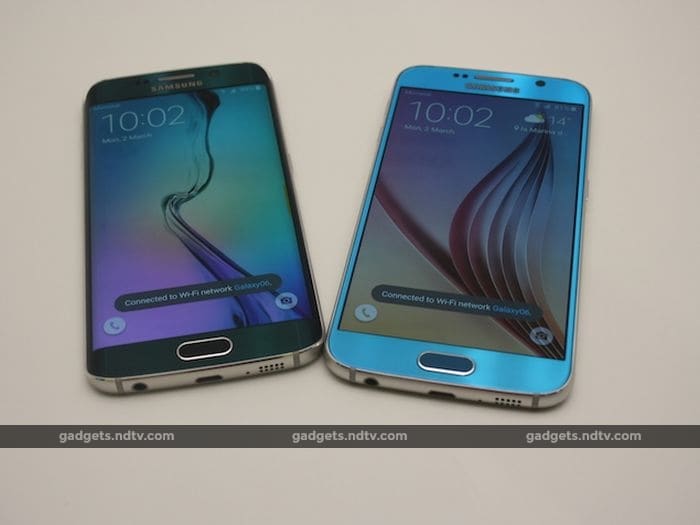Samsung Galaxy S6 and Galaxy S6 Edge: First Look
-
 1/14
1/14Samsung Galaxy S6 and Galaxy S6 Edge: First Look
The Samsung Galaxy S6 and the Galaxy S6 Edge, seen here side by side, were launched by the Galaxy Unpacked 2015 event at the MWC trade show in Barcelona
-
 2/14
2/14Samsung Galaxy S6 and Galaxy S6 Edge: First Look
The Samsung Galaxy S6 looks quite similar to its predecessor, the Galaxy S5, actually. It has a similar rectangular home button which Samsung claims incorporates a better touch-type fingerprint sensor
-
 3/14
3/14Samsung Galaxy S6 and Galaxy S6 Edge: First Look
Unlike the Samsung Galaxy Note Edge's single curved edge, the Galaxy S6 has two curved edges. Swiping across the edges for different functions felt organic from the get-go
-
 4/14
4/14Samsung Galaxy S6 and Galaxy S6 Edge: First Look
Both the smartphones have all-glass front and back with a metal trim running along the edges. Unfortunately, the use of glass also means that the rear is a fingerprint magnet
-
 5/14
5/14Samsung Galaxy S6 and Galaxy S6 Edge: First Look
Samsung's used Corning Gorilla Glass 4, which aids in adding durability to the devices, on the Galaxy S6 and Galaxy S6 Edge
-
 6/14
6/14Samsung Galaxy S6 and Galaxy S6 Edge: First Look
We tried the fingerprint sensor with both the phones and noticed that it was much better than what we've seen in Samsung's previous flagships, with the one-touch home button all that's required for the screen to unlock
-
 7/14
7/14Samsung Galaxy S6 and Galaxy S6 Edge: First Look
The right panel of the Galaxy S6 Edge, with the power button visible that is easy to reach and has pretty good tactile feedback as well
-
 8/14
8/14Samsung Galaxy S6 and Galaxy S6 Edge: First Look
Samsung includes a 16-megapixel rear camera with OIS (optical image stabilisation), LED flash and a faster f/1.9 aperture
-
 9/14
9/14Samsung Galaxy S6 and Galaxy S6 Edge: First Look
The tapering metal trim on the Galaxy S6 Edge reveals the side edge of the display which can be used to show notifications and other information
-
 10/14
10/14Samsung Galaxy S6 and Galaxy S6 Edge: First Look
The People Edge feature on the Galaxy S6 Edge lets users add five most used contacts to the edge of choice
-
 11/14
11/14Samsung Galaxy S6 and Galaxy S6 Edge: First Look
The curved edges visible at the bottom of the Galaxy S6 Edge, along with the slightly protruding home button
-
 12/14
12/14Samsung Galaxy S6 and Galaxy S6 Edge: First Look
The protruding camera lens on the Samsung Galaxy S6 Edge, with the discrete volume buttons visible on the top of the left panel
-
 13/14
13/14Samsung Galaxy S6 and Galaxy S6 Edge: First Look
Samsung has used soft metal for the trim which combined with its chamfered edges allowed us to grip it easily
-
 14/14
14/14Samsung Galaxy S6 and Galaxy S6 Edge: First Look
The bottom edge of both the Galaxy S6 and the Galaxy S6 Edge includes the speakers, Micro-USB slot, 3.5mm jack, microphone, and two plastic strips for receiving network signals

![[Sponsored] Haier C90 OLED TV | Dolby Vision IQ, 144Hz OLED and Google TV in Action](https://www.gadgets360.com/static/mobile/images/spacer.png)









